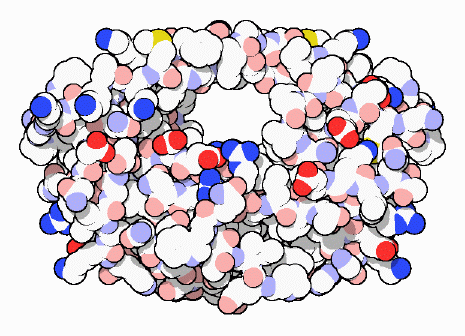|
Inhaltsübersicht | Nanomaschinen | Moleküle | Programme | Kurse | Fun | Links |
||
| > |
HIV Protease

A Target for AIDS Therapy
Drugs that attack HIV-1 protease are one of the triumphs of modern medicine. The AIDS epidemic started a few short decades ago-- before that, HIV was unknown. These drugs demonstrate the powerful tools that medical science has to combat a new disease. Already, researchers have discovered a panel of effective drugs which slow the growth of the virus to a standstill. Important problems still remain, however. In particular, an effective vaccine against HIV is not available. But today, HIV-infected individuals have potent options for treatmentAttacking HIV
HIV-1 protease performs an essential step in the life cycle of HIV. Like many viruses, HIV makes many of its proteins in one long piece, with several proteins strung together. HIV-1 protease has the job of cutting this long 'polyprotein' into the proper protein-sized pieces. The timing of this step is critical. The intact polyprotein is necessary early in the life cycle, when it assembles the immature form of the virus. Then, the polyprotein must be cut into the proper pieces to form the mature virus, which can then infect a new cell. The cleavage reactions must be timed perfectly, allowing the immature virus to assemble properly before the polyprotein is broken. Because of its sensitive and essential function, HIV-1 protease is an excellent target for drug therapy. Drugs bind tightly to the protease, blocking its action, and the virus perishes because it is unable to mature into its infectious form.
An Enzyme Under Scrutiny
The atomic structure of HIV-1 protease has made much of this work possible. The first structures were reported in 1989. A decade later, over one hundred structures are available in the PDB, including several genetic strains of the enzyme, complexes of the enzyme with many different drugs and inhibitors, and dozens of mutant enzymes. Hundreds more are stored in the proprietary databases of pharmaceutical companies, where they are used to test and refine new drug candidates. Overall, HIV-1 protease is now one of the best-studied enzymes known to medicine. It is an enigmatic enzyme, however, that still hides many of its secrets.Last changed by: A.Honegger,